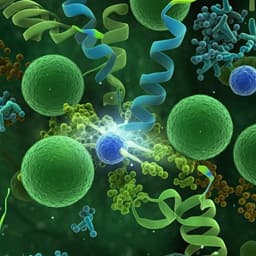
Food Science and Technology
Uncovering the anti-inflammatory potential of *Lactiplantibacillus Plantarum* fermented *Cannabis Sativa* L seeds
L. Shan, A. Tyagi, et al.
Inflammatory responses driven by cytokines such as TNF-α, IL-6, IL-1β, IL-18 and mediators like NO contribute to numerous diseases and remain therapeutic targets. Hemp (Cannabis sativa L.) seeds are nutrient-dense and low in psychoactive Δ9-THC, while containing non-psychoactive cannabinoids (e.g., CBDA, CBGA, CBD, CBG) and other bioactives (phenolics, organic acids, unsaturated fatty acids, protein hydrolysates) with reported anti-inflammatory properties. Fermentation by lactic acid bacteria (LAB) can liberate or transform bioactive molecules from food matrices, potentially enhancing functionality. However, LAB fermentation of hemp seeds for anti-inflammatory applications and the associated metabolic changes are underexplored. This study investigates whether fermentation with Lactiplantibacillus plantarum enhances the anti-inflammatory potential of hemp seeds, elucidates molecular mechanisms (TLR4/NF-κB pathway), identifies key metabolites via untargeted metabolomics, validates principal anti-inflammatory compounds (indolelactic acid and homovanillic acid), and assesses their stability and bioaccessibility during simulated digestion and transport across a Caco-2 cell monolayer.
The paper situates its research within several bodies of work: (1) Inflammation pathophysiology emphasizes cytokines (TNF-α, IL-1β, IL-6, IL-18) and NO as central mediators and validated clinical targets. (2) Hemp seeds contain non-psychoactive cannabinoids and other bioactives with anti-inflammatory, antioxidant, neuroprotective, and anxiolytic activities, although food-related research is limited due to hemp’s historical industrial use. (3) Fermentation, particularly by LAB, is widely used to enhance food functionality, producing metabolites (organic acids, peptides) with immunomodulatory and anti-inflammatory properties; however, LAB-fermented hemp seed products targeting inflammation are scarcely studied. (4) Untargeted metabolomics (LC-MS) provides a powerful approach to profile metabolic changes during fermentation and relate them to bioactivity, but key metabolic pathways and differential metabolites in raw vs fermented hemp seeds are not well characterized. These gaps motivate the current work to link metabolite changes from L. plantarum fermentation to anti-inflammatory effects and mechanism.
Overview: The study screened 10 microbial strains to ferment hemp seeds and assessed anti-inflammatory activity in LPS-stimulated RAW 264.7 macrophages, followed by mechanistic protein analyses (TLR4/NF-κB/iNOS), untargeted metabolomics (UHPLC-QTOF-MS), targeted quantification of candidate metabolites (HPLC-DAD), in vitro simulated digestion, and Caco-2 cell monolayer bioaccessibility assays.
Materials and strains: Cheungsam Cannabis sativa L. seeds (Korea). RAW 264.7 and Caco-2 cell lines (ATCC). Ten strains (isolated from kimchi): Lactiplantibacillus plantarum subsp. plantarum, Lactobacillus paracasei, Lactobacillus pentosus, Lactobacillus curvatus, Lactobacillus reuteri, Leuconostoc mesenteroides, Pediococcus acidilactici, Pediococcus pentosaceus, Saccharomyces boulardii, Streptococcus thermophilus. For definitive fermentation, L. plantarum subsp. plantarum OHSH:1 was used. Reagents included LPS (E. coli O111:B4), corticosterone acetate (positive control), IA and HVA standards (>99%), enzymes for digestion (α-amylase, pepsin, pancreatin, bile salts), and antibodies (TLR4, NF-κB p65, iNOS).
Fermentation: Raw hemp seeds (RHS) were milled and suspended in water (1:20 w/v), sterilized at 121 °C for 15 min. For the final product, sterilized slurry was inoculated with L. plantarum OHSH:1 at 10% v/v (2×10^7 CFU/mL) and fermented at 37 °C, 150 rpm, 24 h. Fermented hemp seeds (FHS) were freeze-dried and stored at −20 °C. For initial screening, hemp seeds were fermented individually with each of the 10 strains; final pH ranged 4.0 ± 0.5 to 4.6 ± 0.2, indicating growth.
Extraction: RHS and FHS powders were extracted thrice with 70% ethanol (1:20 w/v, 24 h, RT) with centrifugation (4000×g, 10 min) after each extraction. Combined supernatants were freeze-dried and stored at −20 °C.
Cell culture: RAW 264.7 in DMEM + 10% FBS + 1% penicillin, 37 °C, 5% CO2. Caco-2 cultured similarly; for transport studies, cells seeded on Transwell inserts (1×10^5 cells/mL) and differentiated 14 days to form monolayers.
Cytotoxicity: EZ-Cytox assay. RAW 264.7 seeded (1×10^5 cells/well, 96-well). Treated with RHS/FHS extracts across 3.906–1000 µg/mL for 24 h; absorbance at 450 nm; viability calculated per kit instructions.
Anti-inflammatory assays: RAW 264.7 seeded (1×10^5 cells/well, 96-well), incubated 12 h, stimulated with 50 µL of 10 µg/mL LPS for 4 h. Then 100 µL extract samples added and incubated 24 h. Positive control: 10 µg/mL corticosterone acetate in DMSO. ELISAs quantified TNF-α, IL-1β, IL-6, IL-18, and NO in supernatants. Initial screen tested 10 fermented hemp seed extracts at 500 µg/mL. Detailed dose-response tested FHS at 50–500 µg/mL; non-inflamed “normal” cells also tested for basal cytokines.
Immunoblotting: Cells lysed with RIPA; protein quantified (Lowry). Equal protein subjected to SDS-PAGE and immunoblotting for TLR4, NF-κB p65, and iNOS; β-actin as loading control. Primary antibodies 1:1000 overnight at 4 °C; secondary 1:3000 for 1.5 h RT. Bands visualized by ECL (Fusion FX) and quantified by ImageJ. n=2 for immunoblots.
Untargeted metabolomics (UHPLC-QTOF-MS): Extracts (5 mg/mL in 70% ethanol, 0.22 µm filtered) analyzed on ExionLC UHPLC with PDA and SCIEX QTOF-MS in both ESI+ and ESI−. Column: Accucore C18 (100×3 mm). Solvents: A water + 0.1% formic acid, B methanol; 0.5 mL/min gradient (0–30 min program). Source temp 320 °C; spray/tube lens voltages 3.6 kV/120 V (positive), 2.7 kV/−120 V (negative); sheath gas 40 arb; aux gas 8 arb; scan 115–1000 m/z, 1 s. Multivariate (PCA) and univariate (volcano plot) analyses performed; top 20 differential metabolites selected for correlation with bioactivity. n=6 per group in metabolomics.
Targeted quantification (HPLC-DAD): Standards and samples prepared in 70% ethanol, 0.22 µm filtered. Agilent 1260 with DAD; Phenomenex Gemini C18 (4.6×250 mm, 5 µm). Mobile phases: A 50 mM ammonium formate in water (pH 6.55), B 50 mM ammonium formate in methanol (pH 6.55). Gradient: 0–10 min 0% B; 10–20 min 40% B; 20–30 min 100% B. Flow 1 mL/min; injection 10 µL. Quantified IA and HVA in RHS and FHS.
In vitro simulated digestion: Samples: 500 µg/mL FHS, 500 µg/mL RHS, 50 µg/mL IA, 50 µg/mL HVA. Three sequential stages: saliva (0.25 mL saliva with 16.25 mg α-amylase in 12.5 mL 1 mM CaCl2, pH 7.0; 10 min; G1), gastric (pH 2.0; 0.25 mL gastric juice with 0.4 g pepsin in 10 mL 0.1 M HCl; 2 h; G2 then adjusted to pH 7.0), intestinal (pH 7.5; 2.5 mL intestinal juice with 1 g pancreatin + 6 g bile salts in 50 mL 0.1 M NaHCO3; 2 h; G3). Samples filtered and used immediately for assays.
Caco-2 bioaccessibility: Post-digestion intestinal samples (FHS-G3, RHS-G3) applied to Caco-2 monolayers (HBSS pH 6.8 wash; exposure 2 mL for 2 h). Upper and lower compartments collected for HPLC quantification of IA and HVA. Bioaccessibility (%) calculated as mass in bioaccessible fraction/total mass.
Statistics: Data mean ± SD. ELISA n=3; immunoblot n=2; metabolomics n=6. One-way ANOVA (SPSS 24.0) with p<0.05 significance. Metabolomics analyses performed using OmicStudio tools.
- Safety: RHS and FHS showed no cytotoxicity in RAW 264.7 cells up to 1000 µg/mL.
- Initial screening (500 µg/mL): Among 10 fermented hemp seed preparations, L. plantarum-fermented hemp seeds (FHS) and S. boulardii-fermented hemp seeds (BIF) reduced TNF-α more than RHS. Representative values in LPS-stimulated cells: RHS TNF-α 357.5 pg/mL; FHS 301.25 pg/mL; BIF 304.3 pg/mL. IL-6 markedly lower with FHS (101.167 pg/mL) than RHS (336.1 pg/mL). NO reduced with FHS (37.17 µM) vs RHS (113.31 µM).
- Dose response (FHS 50–500 µg/mL): In LPS-stimulated cells, FHS reduced TNF-α, IL-6, IL-1β, and NO in a dose-dependent manner. At 500 µg/mL, TNF-α reduction was comparable to the positive control (corticosterone acetate 10 µg/mL). In non-inflamed cells, FHS up to 500 µg/mL did not alter basal cytokine/NO levels.
- Mechanism: Western blots showed LPS increased TLR4 and NF-κB p65; both were significantly reduced by FHS, similar to corticosterone acetate. iNOS expression (downstream of TLR4/NF-κB) was also downregulated by FHS under LPS stimulation, indicating inhibition of the TLR4/NF-κB/iNOS axis.
- Metabolomics: UHPLC-QTOF-MS identified 107 metabolites. PCA showed clear separation between RHS and FHS profiles. Organic acids notably increased post-fermentation (e.g., 2-furoic acid, gluconic acid, indolelactic acid, citric acid, homovanillic acid). Volcano plots and selection of 20 differential metabolites highlighted organic acids and peptides as key changes.
- Correlation analysis: Seven metabolites positively associated with inhibition of IL-6, IL-18, TNF-α, IL-1β, and NO: Ala-Thr-Thr-Tyr, indolelactic acid, citric acid, 2-furoic acid, gluconic acid, Leu-Val-Thr-Leu-Ala, homovanillic acid.
- Targeted quantification: IA and HVA increased markedly after fermentation. IA: RHS 7.6 µg/mg DW → FHS 72.7 µg/mg DW. HVA: RHS 9.2 µg/mg DW → FHS 57.9 µg/mg DW.
- Anti-inflammatory potency of IA and HVA (IC50, µg/mL): IA—TNF-α 12.63 ± 2.00; IL-1β 9.11 ± 0.21; IL-6 10.67 ± 1.04; IL-18 12.03 ± 1.02; NO 8.74 ± 0.32. HVA—TNF-α 11.84 ± 1.02; IL-1β 10.21 ± 1.00; IL-6 11.53 ± 1.62; IL-18 10.94 ± 0.31; NO 9.19 ± 0.28.
- Simulated digestion: IA and HVA showed good stability through simulated saliva and gastric phases; slight IA reduction in intestinal phase; HVA decreased in alkaline intestinal juice, potentially due to enzymatic/pH effects or interactions with matrix components. Anti-inflammatory activity of FHS, RHS, IA, and HVA was unchanged after salivary digestion, increased post-gastric digestion, and slightly decreased after intestinal digestion, with no significant difference from original FHS overall.
- Bioaccessibility (Caco-2 model): In FHS, IA 61.27 ± 1.04% and HVA 57.79 ± 1.77% bioaccessible. In RHS, IA 56.825 ± 2.37% and HVA 50.945 ± 1.29%. Differences between FHS and RHS were not significant, indicating ~60% of IA/HVA can be absorbed/available post-digestion.
Fermentation of hemp seeds with L. plantarum significantly enhanced anti-inflammatory activity in an LPS-stimulated macrophage model, reducing key cytokines (TNF-α, IL-6, IL-1β) and mediator NO without cytotoxicity. Mechanistically, FHS attenuated TLR4 and NF-κB p65 expression and downregulated iNOS, supporting inhibition of the TLR4/NF-κB pathway underlying the observed bioactivity. Untargeted metabolomics revealed substantial remodeling of the metabolite profile upon fermentation, particularly increases in organic acids and emergence of peptides. Correlation analyses linked several of these metabolites to anti-inflammatory effects, with IA and HVA identified as principal contributors. Targeted HPLC-DAD validation showed large post-fermentation increases in IA and HVA content, and both compounds displayed low IC50 values against inflammatory cytokines and NO, corroborating their functional relevance. Simulated digestion and Caco-2 transport studies demonstrated that IA and HVA remain largely stable and bioaccessible, supporting their potential effectiveness upon oral intake. Collectively, these findings indicate that L. plantarum fermentation enhances the anti-inflammatory potential of hemp seeds by generating and/or enriching specific bioactives, chiefly IA and HVA, and that these metabolites can be accessible for absorption, thereby offering a plausible route for functional food applications targeting inflammation.
This work demonstrates that L. plantarum fermentation substantially augments the anti-inflammatory properties of hemp seeds by modulating the TLR4/NF-κB/iNOS pathway and enriching key metabolites, notably indolelactic acid and homovanillic acid. Comprehensive metabolomics identified fermentation-driven shifts in organic acids and peptides, while targeted quantification and bioactivity assays verified IA and HVA as principal contributors with low IC50s across multiple inflammatory endpoints. In vitro digestion and Caco-2 assays confirmed the stability and bioaccessibility (~60%) of these compounds. The study provides a mechanistic and metabolite-level basis for developing fermented hemp seed-based functional foods or nutraceuticals aimed at inflammation-associated conditions. Future research should include in vivo studies and clinical trials to validate efficacy and safety, optimization of fermentation processes for standardized metabolite profiles, and investigation into the stability and activity of anti-inflammatory peptides identified post-fermentation.
The study is primarily in vitro, relying on LPS-stimulated RAW 264.7 macrophages and Caco-2 monolayers; thus, translatability to in vivo and clinical outcomes remains to be established. Western blot analyses had limited replicates (n=2). Only one L. plantarum strain (OHSH:1) was used for definitive fermentation, and broader strain/product variability was not explored beyond initial screening. Simulated digestion models may not fully recapitulate human gastrointestinal conditions, and interactions within complex diets were not assessed.
Related Publications
Explore these studies to deepen your understanding of the subject.







